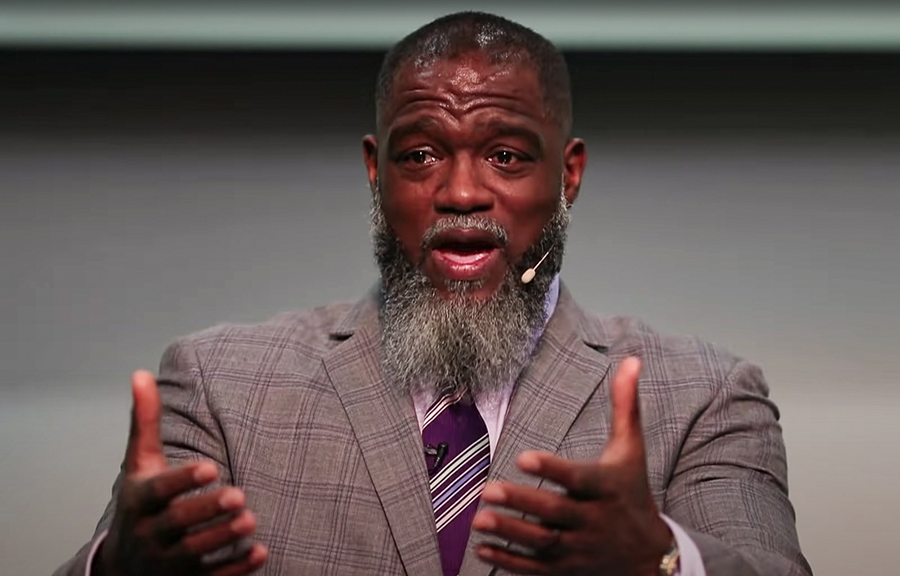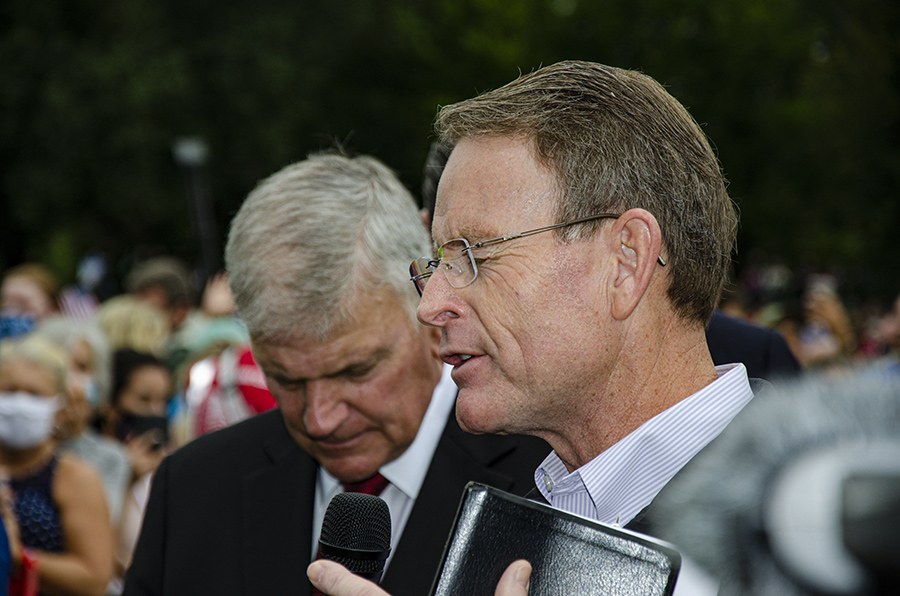In August, fifth-grade elementary school teacher Laura Morris tearfully announced her resignation during a televised school board meeting in Loudoun County, Virginia.
“This summer I have struggled with the idea of returning to school, knowing that I’ll be working yet again with a school division that, despite its shiny tech and flashy salary, promotes political ideologies that do not square with who I am as a believer in Christ,” Morris said during the meeting’s public comment period.
“Within the last year, I was [told] in one of my so-called equity trainings that white, Christian, able-bodied females currently have the power in our schools and ‘this has to change,’” recounted Morris, who had taught for five years at Lucketts Elementary School in Leesburg, Virginia.
“School board, I quit,” she continued. “I quit your policies, I quit your training, and I quit being a cog in a machine that tells me to push highly politicized agendas to our most vulnerable constituents—children.”
Over the past several months, similar scenes have played out in school board meetings across the country as teachers and parents alike vehemently oppose an agenda approved in July by the National Education Association (NEA), the nation’s largest teachers’ union, to promote critical race theory (CRT) in all 50 states, including 14,000 public school districts.
According to Encyclopedia Britannica, critical race theory holds that race is not a biological feature but rather a socially constructed category “used to oppress and exploit people of color. Critical race theorists hold that the law and legal institutions in the United States are inherently racist insofar as they function to create and maintain social, economic and political inequalities between whites and nonwhites, especially African Americans.”
In July, at its annual meeting, the NEA, which represents 3 million public school employees, approved a resolution to publicly “convey its support” for critical race theory, oppose restrictions in state legislatures, promote political activism in schools and “teach lessons about structural racism and oppression.”
As part of the resolution, educators pledged to design a study that “critiques empire, white supremacy, anti-Blackness, anti-Indigeneity, racism, patriarchy, cisheteropatriarchy, capitalism, ableism, anthropocentrism and other forms of power and oppression at the intersections of our society … .” The NEA also resolved to “research” organizations that oppose critical race theory—including grassroots parent organizations—and provide resources to groups and individuals targeting them.
So, what are faithful Christians to make of an ideology that exploits racial disparities but offers no path to peace, redemption or reconciliation between people groups?
In his national bestseller, “Fault Lines—The Social Justice Movement and Evangelicalism’s Looming Catastrophe,” published earlier this year, Voddie Baucham, dean of the School of Divinity at African Christian University, in Lusaka, Zambia, writes: “At the heart of the ‘woke’ movement lies the idea that the sin of racism is no longer to be understood as an individual sin. Instead, the term now incorporates the idea of ‘institutional/structural racism’ and its implications.”

Baucham, a Los Angeles native who has master’s and doctoral degrees from two Southern Baptist seminaries and formerly was a pastor in Texas, is concerned that evangelical pastors, churches and academic institutions could go the way of mainline protestant denominations, which have already embraced a “theology of antiracism” and with it “the new original sin, which ironically, also happens to be the new unpardonable sin.”
“It is the antiracists who have abandoned the Gospel since, in their view, there is no good news of grace,” Baucham writes. “There is only law.”
Describing CRT as the tenets of a “works-based righteousness,” Baucham suggests that a critical social justice movement within evangelicalism “is a covert attack on the sufficiency of Scripture.”
“The idea that we need a new canon to be able to decipher what the Bible says, or more specifically, what it means regarding race, is quite troubling. The attack on the sufficiency of Scripture should serve as a call to arms.”
Citing 2 Timothy 3:16, that the Bible is “profitable for teaching, for reproof, for correction, and for training in righteousness” (ESV), Baucham contends in his book that “since racism is undoubtably a ‘righteousness’ issue, the Bible is profitable for teaching those who are ignorant about race, rebuking those who are in sin concerning race, correcting those who are in error about race, and training everyone who is pursuing righteousness in regard to race. To put a finer point on it, there is not a book in the world that is better suited to address men on the issue of race than the Bible.”
Baucham warns of attempts by “the cult of antiracism” to sabotage the church’s mission to be Gospel-driven ambassadors of reconciliation with its heretical teachings of what he calls “Ethnic Gnosticism.”
“Ethnic Gnosticism, then, is the idea that people have special knowledge based solely on their ethnicity,” Baucham writes. “This is a hallmark of both critical race theory and its predecessor, critical theory.”
Tony Perkins, president of the Family Research Council, is concerned about the public policy implications of CRT taking root in government entities, particularly the public schools. He is urging parents and teachers to boldly and courageously stand for Biblical truth about race at a time when CRT is infiltrating American classrooms.

“Critical race theory is state-sponsored racism that has been injected into our classrooms in the form of oppressive matrix, black power rallies and lessons on deconstruction of racial identity,” Perkins said during a broadcast of his “Pray, Vote, Stand” program. “Students in red and blue states are being fed ridiculous lies that [type] fonts are racist, Hawaiian shirts are imperialist, Latin is oppressive and advanced algebra is inherently unjust.”
Perkins summed up the CRT framework: “If you’re white, you’re a racist. If you’re anything else you’re a victim. The content of your character, your God-given talents and life experiences frankly don’t matter. We are all presumed guilty or innocent of discrimination based on one thing, the color of our skin.
“This is about turning our children against the principles of democracy, equal opportunity and the founding ideals of our nation,” Perkins continued, speaking of the end goal of CRT’s true believers. “It’s about starting a race-based revolution and overthrowing the Constitution of the United States in the process.”
Perkins said CRT errs by reducing every issue—from health care to education to business to law—to race, and by overstating the extent that racism pervades society.
“America is inherently evil, and the only way to deal with the sins of our past that divided us is to divide us further with a new form of state-sponsored racism,” Perkins said, characterizing the CRT view.
Perkins said Christians must heed the Apostle Paul’s warning in Colossians 2:8: “See to it that no one takes you captive through philosophy and empty deception, according to the tradition of men, according to the elementary principles of the world, rather than according to Christ” (NASB 1995).
A growing number of state legislatures across the country have banned the use of CRT in public schools, including Montana, South Dakota, Idaho, Tennessee, Texas, Iowa, New Hampshire, Arizona and South Carolina. State school boards in Florida, Georgia, Utah and Oklahoma have even adopted measures barring CRT-related discussions. Some local school boards in Colorado, Kentucky, North Carolina and Virginia have adopted measures opposing CRT.
And while CRT’s ideology permeates corporate America through racial reeducation programs, anti-racism and diversity training and other equity initiatives, church and ministry leaders are grappling with how to represent the Gospel as the great unifier around oneness in Christ.
“The tension is real,” Meeke Addison, co-director of special initiatives with the American Family Association (AFA), told Decision. “But I think the tension really revolves around misunderstanding the unity that the Bible calls us to. The Bible does not call us to blanket unity. The Bible actually calls us to ‘preserve the unity of the Spirit in the bond of peace’” (Ephesians 4:3, NASB 1995).
Addison, author of the AFA Cultural Institute’s “A Biblical Response to Critical Race Theory,” said that the guilt and condemnation ascribed by CRT to white people today for her ancestors’ enslavement is antithetical to the Gospel. “We are not called to unite with anyone who is pulling us in the opposite direction of the cross,” she said. “If empathy for a person does not produce the presentation of the Gospel, then it’s futile and fleeting. In Jesus Christ, there is newness of life that extends to all, no matter what class or background you come from.”
Photo: Anna Tolipova/Alamy Stock Photo
